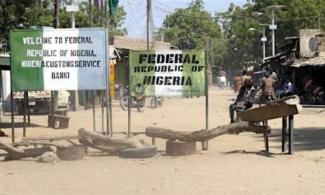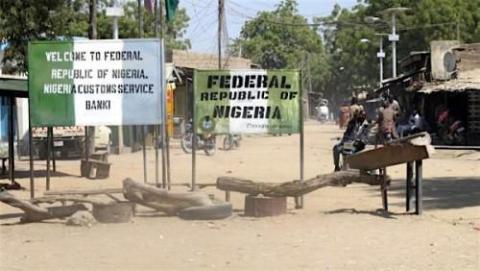
The partial closure is as a result of joint security exercise
conducted by the customs, immigration, and other security outfits
aimed at securing Nigeria’s borders. The exercise started on August
20.

Prices of foodstuffs and other commodities have increased in many
border towns and most of the country’s cities as the borders remain
partially closed, Daily Trust reports.
The partial closure is as a result of joint security exercise
conducted by the customs, immigration, and other security outfits
aimed at securing Nigeria’s borders. The exercise started on August
20.
The authorities said the security exercise was called at the instance
of the National Security Adviser (NSA).
Daily Trust reports that many Nigerians who do trans-border business
have been experiencing difficulties in carrying out their trade. This
has forced them to cut their demand even as they increased the prices
of their little stocks, our reporters learnt.
Worst hit are residents of border communities where prices of
foodstuffs and other commodities have soared. In some border
communities in Ogun State, petrol was even sold for N350 per litre,
instead of government regulated price of N145/litre.
Also in border communities in Kwara state, petrol price that used to
be N160 is now being sold for between N200 and N400. The increment in
petrol price in the areas has also led to hike in transportation fare
which has also affected the prices of locally produced food items like
yam, yam flour and others in most towns in Kwara State.
‘Closure blocked smuggling of petrol’
But a renowned financial expert Bismarck Rewane said the closure of
the border has forced the price of petrol down to N144 per litre. Mr
Rewane, who is the Managing Director and Chief Executive Officer of
Financial Derivatives Company Limited, in a report he presented at the
monthly Lagos Business School’s executive breakfast meeting for
September, also said the closure had blocked smuggling of petrol to
the neighbouring countries.
Rewane said the development showed that part of the nearly 60 million
litres of petrol said to be consumed daily in Nigeria were smuggled to
the neighbouring countries. He also revealed that diesel price has
also crashed to N210 per litre from N250/litre.
The Group Managing Director of the Nigerian National Petroleum
Corporation (NNPC), Malam Mele Kyari, also said the volume of petrol
evacuated from depots to filling stations across the country has
dropped significantly since the border closure became effective. The
NNPC boss said this on his verified twitter handle @MKKyari.
Between June 2018 and June 2019, the NNPC had imported 21million
litres of petrol for consumption, out of which an average of
44,366,781.77 litres were consumed daily in June 2018; 39,154,764.15
litres in July; 54,144,365.76 litres daily in August of the same year,
and 55,499,192.80 litres daily in September 2018.
However, findings by our correspondents in states where Nigeria shares
a border with neighbouring countries show that prices of rice, poultry
products, some brands of vegetable oil, beans and even fairly used
clothes have increased by between 10 and 30 %. For instance, a bag of
50 kg foreign rice which usually sold for N13,000 and N15,000 before
the closure now goes for N16,000, N18,000 and N20,000 depending on the
brands in many towns and cities in the country.
A resident of Belel in Maiha Local Government Area of Adamawa State
Dauda Abubakar told Daily Trust that price of bread rose in recent
weeks due to restriction of flour import from Cameroon. He said it was
difficult to transport flour from Yola due to bad roads and broken
bridges; hence bakers opted for a cheaper alternative from Cameroonian
side of the border which is closer.
However, a fruits dealer, Muhammad Bello said the restriction
prevented exports of orange into Cameroon, thereby causing a drop in
price. He said the price of a sack of oranges crashed from N9000 to
N7000 as the supply surpassed its demand. Adamawa is one of the three
front line states in the war against Book Haram had been placed under
a form of border restriction since 2015 but renewed control in the
last few weeks caused outcry at the border.
A rice smuggler described the closure as counter-productive, saying
prices of maize began to shoot up the Wurobokki border in Fufore local
government area. In Katsina, prices of foodstuffs have also risen. The
price of 25 litres of vegetable oil has risen from N9,500 to N10,800
in the state. A packet of spaghetti rose from N2,700 to N3,400, while
Macroni rose from N3,400 to N3600.
But the partial closure has heightened smuggling around Lagos border
communities. The smugglers have now resorted to using waterways to
bring contraband items such as rice, frozen poultry products, and
fairly used clothes, shoes and bags into the country.
Despite the increase in smuggling activities, prices of some basic
food items have skyrocketed, with traders and consumers complaining of
limited stocks. Frozen poultry is the most affected in Lagos as a
kilogramme of frozen chicken, which sold for N1,200, now costs N1,600,
while a kilogramme of frozen turkey now sells at N1,700. A trader at
Alaba Rago, a major market in Lagos, Tawa Ibrahim, said that the
border closure was affecting his business.
She said: “Lake Rice (locally produced rice) would have been a better
alternative for us, but we are not getting it to buy… Even the volume
of okra needed to feed this nation cannot be produced in Nigeria. We
rely so much on Cotonou for okra. That is why its price has also shot
up since the border was closed.
A big basket of okra, which sold for N4,000 or N5,000, is now N8,000.”
In Kebbi, the closure of borders with Niger and Benin Republics is
already causing economic hardship to people around the border areas of
Dole Kaina, Lolo, Kamba, and Bachaka.
When Daily Trust visited some of the border towns residents,
particularly farmers and merchants in the area, said the closure of
the borders was already causing them economic hardship.
The district head of Lolo, Alhaji Muhammed Sallah while lamenting over
the situation said, “The situation is becoming unbearable. As you are
aware our people are into farming and they do cross border trade.
Since they close the borders in Lolo we cannot do our farming and we
cannot trade. The prices of commodities are increasing by the days."
He added that the situation was becoming more pathetic because his
people have family, cultural and trade ties with people of Benin and
Niger Republics and because of the border closure his people in Kebbi,
Niger and Benin Republics are suffering.
In Kwara, prices of commodities in all border communities have equally
skyrocketed as a result of the partial closure of the border.
Communities like Gwanara, Bukuro, Okuta, Yaahikra, Chikanda,
Ilesha-Baruba have been at the receiving end of the closure while
prices of rice and edible oil have also increased in the state
capital.
Emir of Gwanara, Alhaji Sabi Idris Kotokotogi during a visit to his
community said the closure of the border is affecting them seriously
adding that “any time the Nigerian government takes any drastic
decision on the closure of our borders it is those of us on the border
that suffers the fate".